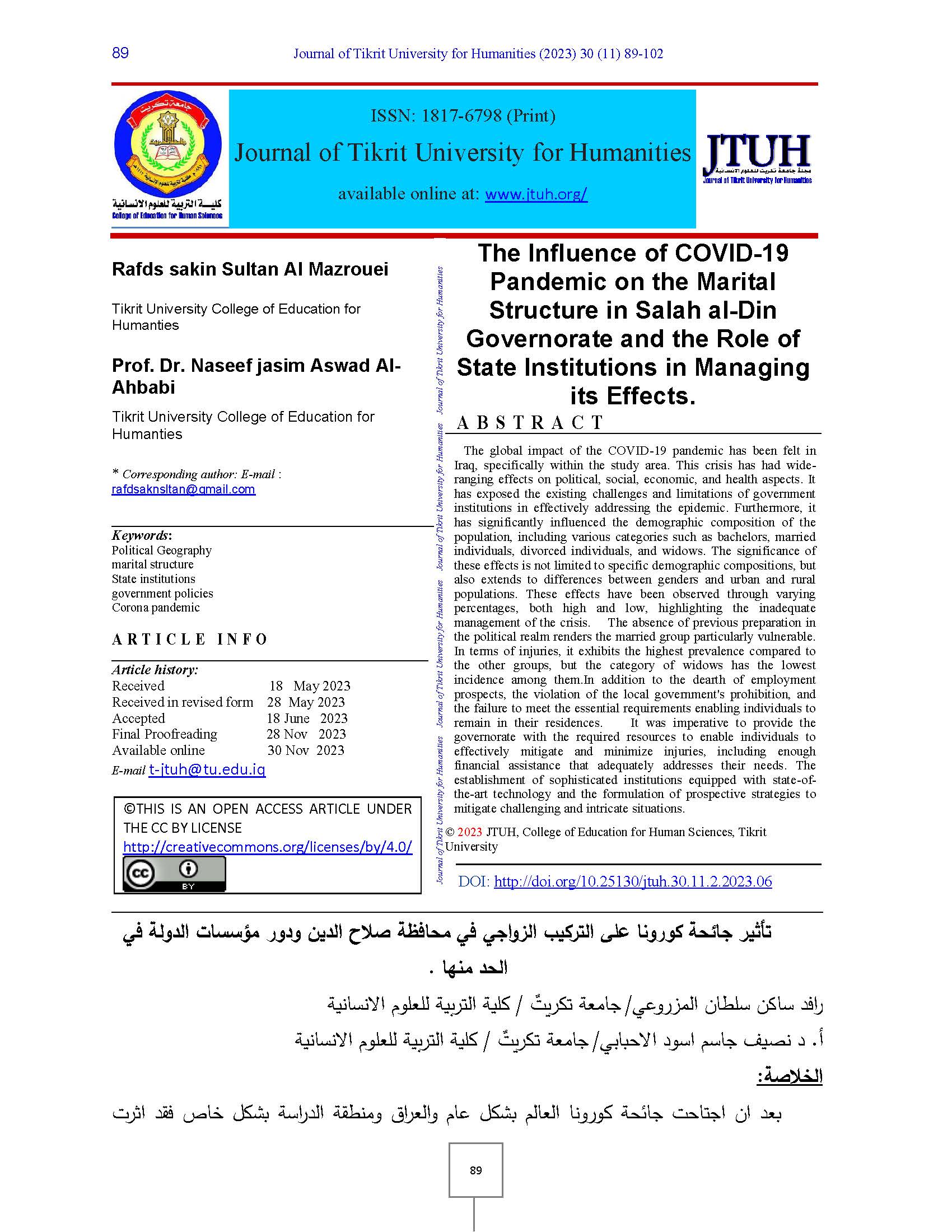The Influence of COVID-19 Pandemic on the Marital Structure in Salah al-Din Governorate and the Role of State Institutions in Managing its Effects
Main Article Content
Abstract
The global impact of the COVID-19 pandemic has been felt in Iraq, specifically within the study area. This crisis has had wide-ranging effects on political, social, economic, and health aspects. It has exposed the existing challenges and limitations of government institutions in effectively addressing the epidemic. Furthermore, it has significantly influenced the demographic composition of the population, including various categories such as bachelors, married individuals, divorced individuals, and widows. The significance of these effects is not limited to specific demographic compositions, but also extends to differences between genders and urban and rural populations. These effects have been observed through varying percentages, both high and low, highlighting the inadequate management of the crisis. The absence of previous preparation in the political realm renders the married group particularly vulnerable. In terms of injuries, it exhibits the highest prevalence compared to the other groups, but the category of widows has the lowest incidence among them.In addition to the dearth of employment prospects, the violation of the local government's prohibition, and the failure to meet the essential requirements enabling individuals to remain in their residences. It was imperative to provide the governorate with the required resources to enable individuals to effectively mitigate and minimize injuries, including enough financial assistance that adequately addresses their needs. The establishment of sophisticated institutions equipped with state-of-the-art technology and the formulation of prospective strategies to mitigate challenging and intricate situations.
Metrics
Article Details

This work is licensed under a Creative Commons Attribution 4.0 International License.
College of Education for Humanities, TIKRIT UNIVERSITY. THIS IS AN OPEN ACCESS ARTICLE UNDER THE CC BY LICENSE http://creativecommons.org/licenses/by/4.0/
References
. Abd Rabbo, Muhammad Muhammad, Corona Pandemic to Achieve Human Justice, Journal of Strategic Disaster Studies, University of Palestine, Volume 2, Issue 5, Gaza, 2020, p. 3.
Nujaiman, Akram Muhammad, Corona pandemic and its social repercussions, master's thesis, College of Arts, Anbar University, 2021, p. 46..
Al-Saadi, Abbas Fadel, Studies in Population Geography, 1st Edition, Dar Al-Kutub for Printing and Publishing, Baghdad, 2020, p. 118.
Najm Al-Din, Ahmed, Population Geography of Iraq, 1st Edition, University of Baghdad, Baghdad, 1993, p. 159..
Atwi, Abdullah, Population Geography, 1st Edition, Arab Renaissance House for Printing and Publishing, Beirut, 2001, pg. 223..
Abu Ayanah, Fathi Muhammad, Population Geography, 4th Edition, University Knowledge House, Egypt, 1993, p. 245..
Jubair, Ali Saadi Abdel-Zahra, The Repercussions of the Corona Pandemic on the Iraqi Economy, Hammurabi Magazine, Issue 35, p. 48..
Taha Mahmoud, Health Challenges and Social Solidarity, Corona Virus as a Model, Master Thesis, College of Arts, University of Baghdad, 2021, p. 42..
Al-Khafaf, Abd Ali, population geography, general foundations, first edition, Dar Al-Fikr for printing, publishing and distribution, Amman, Jordan, 1999..




